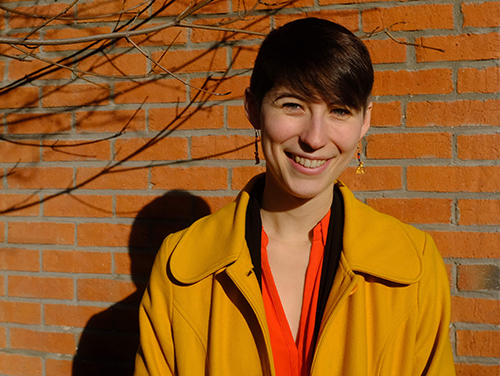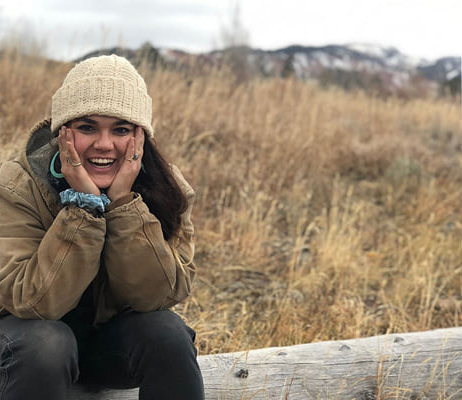Two UM Alumna to Journey Abroad on Fulbright Scholarships

MISSOULA – Two University of Montana graduate student alumna will head abroad on Fulbright Scholarships this fall to connect with local communities and glean knowledge not only relevant to their research, but deeply personal as well.
Beatrice Garrard, who graduated from UM this spring, will conduct research on Jewish migration in Lithuania for a historical novel she is writing. Aubrey Pongluelert, a 2020 graduate, will explore traditional agricultural knowledge and seed sovereignty in Thailand.
Considered the flagship international education exchange program sponsored by the U.S. government, Fulbright Scholarships promote international goodwill by offering opportunities for students and young professionals to undertake international graduate study, advanced research, university teaching and primary and secondary school teaching worldwide. The prestigious scholarships cover round-trip flights and room and board for the year abroad.

UM creative writing alumna Beatrice Garrard is interested in Jewish migration in Lithuania, and she will conduct background research and interviews in the country for her historical novel with her Fulbright Scholarship.
From Edmonds, Washington, Garrard earned her bachelor’s degree in history from Stanford in 2016 and her Master of Fine Arts in creative writing from UM this past semester.
A Jewish-American, Garrard previously traveled to Lithuania as a Yiddish language student. For her Fulbright she will travel to Vilnius, the country’s capital, to research prewar Jewish migration. A large modern city interspersed with the architectural and living remnants of its status as one of the largest Jewish centers in Europe, its Old Town is a UNESCO World Heritage Site.
Garrard’s project, titled “Those Left Behind: Memory and Migration in Prewar Lithuania,” will draw on Yiddish archives and oral histories from the country’s Judaica Research Center, as well as interviews with local experts.
“The wealth of knowledge available in Vilnius will allow me to fulfill a longtime goal – to finish a novel that, in examining the past, illuminates the present,” Garrard said.
The project will focus on a perspective not usually highlighted in current migration narratives – women, children and communities left behind from migrants – and exchanges between Jewish and Christian Lithuanians.
Pandemic allowing, Garrard also hopes to hold a reading circle for locals based around Yiddish folktales and a formal public reading of her novel when complete to welcome input.
Garrard has a wealth of writing and teaching experience, having served as an editor for UM’s CutBank Literary Magazine, an educational outreach teacher for the Burke Museum of Natural History and Culture in Seattle and as a teacher at the Palo Alto School for Jewish Education.
The recipient of numerous writing prizes, she completed a novel draft and M.F.A. thesis about Russian-Jewish immigrants in Detroit in the 1920s.
“Pursuing my M.F.A. at UM gave me a chance to connect with incredible peers and mentors,” Garrard said. “The M.F.A. was my first real opportunity to live and breathe writing and literature full-time. I'm especially thankful for my cohort, who inundated me with great ideas, advice, friendship and a list of reading recommendations I'll be chewing through for years to come.”
After publishing her ongoing novel, Garrard hopes to teach writing in a high school or community college, focusing on social justice.
“In college, I co-directed Project WRITE, an outreach program that brought free creative writing classes to underserved, mostly BIPOC high school students,” she said. “These are the voices and stories we need most as we strive for a more diverse and equitable future. I want to empower young people by encouraging self-expression and bringing underrepresented writers into the literary fold.”

Pongluelert, from Fresno, California, earned a degree in environmental studies and studio art from Oberlin College and a Master of Science in environmental studies from UM in 2020. She is originally from Thailand.
For her Fulbright, Pongluelert will travel to Chiang Mai, a city in mountainous northern Thailand, where she will study traditional agricultural practices at a cooperative organic farm and community center in the north part of the country.
Pongluelert’s passion for sustainable farming sprouted from her childhood background eating home-grown Thai meals with fresh produce nightly. She draws parallels with growing her own food to creating block printing and paintings in an art studio.
Through involvement with the International Rescue Committee’s New Roots program and Missoula’s Garden City Harvest, she has helped connect refugees with their own growing spaces and is an organizer of the Missoula Food Share Project, a local food mutual aid program.
Pongluelert first became interested in environmental justice issues in UM’s environmental studies program.
“The program’s emphasis on food justice and community deepened my interests in farming’s ability to connect people to place, food’s role in building cultural identity, the importance of traditional agricultural knowledge and the significance of creative languages in sharing this knowledge,” she said.
She said many traditional cultures share agricultural knowledge through artistic mediums such as song, dance and ceremony.
“Art and agriculture share a really vital space in human history,” she said.
For her UM master’s thesis, Pongluelert interviewed 10 women farmer-artists on connecting to land and heritage – a demographic, she said, that is not historically uplifted or recognized for their work. She then created an interpretive portrait of each person in multimedia tapestries incorporating embroidery, painting and sewing.
While abroad, she will learn about the seed bank program at the Pun Pun Center for Self Reliance, travel and talk to farmers and create a network for those who want to practice traditional seed savings. She also will share stories of female farmers through artwork.
Pongluelert said amplifying rural and traditional practices in agriculture may be key to conquering challenges and shifting conditions from climate change and corporate agriculture, developing resilient ecosystems and allowing farmers to adapt and feel empowered.
“Indigenous knowledge that revolves around growing food is what will probably save our food systems, aka our means of survival, since we all eat food,” she said. “That is the knowledge we should be listening to. That is the knowledge we should be celebrating and giving value to.”
###
Contact: Kylla Benes, UM director of prestigious scholarships, 406-243-5241, kylla.benes@umontana.edu.